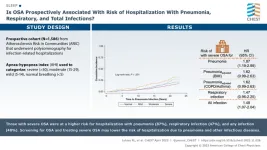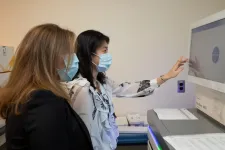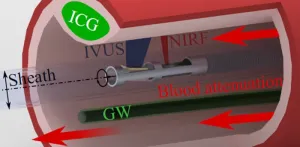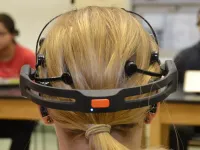(Press-News.org) Social media connects people and amplifies different aspects of humanity in good and bad ways. But the effects of social media appear neither universally good nor bad, but rather present an oscillating, dynamic system that can be divisive but also uniting, a new University of California, Davis, study suggests.
Department of Communication researchers said their findings both in an observational study and simulation speak to the ongoing debate about social media’s contributions to political polarization, misinformation and echo chambers. To conduct their research, they analyzed millions of Twitter posts across the United States, finding that, among other things, people do not always isolate in their own communities, particularly during large world events.
The research, published April 12 in the Journal of Communication, is one of various articles appearing in a special issue titled “Social Media: The Good, The Bad, The Ugly.” The special issue focuses on understanding apparent contradictions in social media research.
Broadcast and viral: What’s the difference?
Researchers observed two types of information diffusion patterns: broadcast and viral spreading.
Broadcast spreading is associated with an integrated public discourse that motivates collective participation in the public dialogue on social media, researchers observed. In other words, broadcast spreading originates from a limited number of sources and quickly reaches a very wide audience. In the study, this happened when a particular topic or issue quickly gained traction on Twitter and was talked about among a large number of people.
In 2020, when the research took place, broadcast spreading topics included the onset of the COVID-19 pandemic, Black Lives Matter protests in response to the killing of George Floyd, and the presidential election debate, for example.
Topics associated with viral spreading, however, build audiences more slowly, and do not typically reach as many people, researchers said. This is referred to in the study as segregated communication.
Viral spreading originates from one source and is transferred only to people that source is connected with. “Think of it like a game of telephone,” said Richard Huskey, an assistant professor of communication and corresponding author for the article. “I learn something, tell you, you tell your friend, and then your friend tells their friend. That’s an example of viral spreading. Information more slowly diffuses from person-to-person,” he said.
These communications focus on different media events and social issues, shape public discussion in different ways, and often lead to different social outcomes.
“We found that public discourse on social media displays an oscillation between integration and segregation depending on external social influences from important real-world events,” said Xuanjun (Jason) Gong, a doctoral candidate in the Department of Communication and lead author of the article.
To gather data, researchers conducted an observational study by gathering real-world Twitter data from 10,155 English-speaking users in the United States with more than 18 million tweets for all 52 weeks in 2020.
They also conducted a simulation exercise. In both studies, they found that broadcast spreading results in more integrated and less segregated discourse networks.
Social media conversations about events and social issues can mobilize movements, researchers said. Additionally, tweets can increase diversity of voices and lead to echo chambers. These effects can lead to both prosocial and antisocial discussions and events as Twitter posts both disrupt and amplify individual and collective issues.
“There is an ongoing debate if social media is one giant echo chamber where people only hear about ideas that correspond to their existing beliefs,” said Huskey. “Our results present a more complicated picture. Under normal circumstances, people might exist in segregated communities on social media. But important real-world events can penetrate those communities, such that people are exposed to new information, thereby disrupting echo chambers.”
Additional co-authors include Haoning Xue, Cuihua Shen and Seth Frey, all researchers in the UC Davis Department of Communication.
END
UC Davis study finds tweets can amplify, disrupt, unite and divide
People engage inside and outside their community, especially during world events
2023-04-13
ELSE PRESS RELEASES FROM THIS DATE:
Highlights from the journal CHEST®, April 2023
2023-04-13
Glenview, Illinois – Published monthly, the journal CHEST® features peer-reviewed, cutting-edge original research in chest medicine: Pulmonary, critical care and sleep medicine and related disciplines. Journal topics include asthma, chest infections, COPD, critical care, diffuse lung disease, education and clinical practice, pulmonary vascular disease, sleep, thoracic oncology and the humanities.
The April issue of the CHEST journal contains 50 articles, including clinically relevant research, reviews, case series, commentary and more. ...
First-in-Canada clinical RNA sequencing platform may improve rare disease diagnostics in pediatrics
2023-04-13
A new clinical RNA sequencing platform at The Hospital for Sick Children (SickKids) is helping to facilitate research into rare genetic conditions and carve a path for Precision Child Health, a movement at SickKids to deliver individualized care for every patient.
RNA sequencing provides a different way of looking at the genes, by looking at how the body interprets the genetic code rather than looking directly at the genetic code itself. While DNA-based tests like genome sequencing take a picture of a person’s genetic code, scientists can better understand how the DNA is being read by also looking at RNA, which carries instructions for making ...
Durability of bivalent boosters against Omicron subvariants
2023-04-13
(CHAPEL HILL, N.C., April 13, 2023) New research led by the UNC Gillings School of Global Public Health shows that bivalent COVID-19 boosters are still providing effective protection from hospitalization and death, even against the most recent omicron subvariants.
Published this week in the New England Journal of Medicine (NEJM), researchers found that the bivalent boosters were 67% effective in preventing hospitalization and death in those who had been previously vaccinated or boosted. Effectiveness waned to 48% after four weeks, 44% after 10 weeks and 38% after 20 weeks.
Though ...
Improving the accuracy of near-infrared fluorescence in cardiovascular imaging
2023-04-13
Cardiovascular diseases (CVDs) or heart diseases are still the leading cause of death globally. Fortunately, doctors are now equipped with more advanced and sophisticated tools that help them diagnose CVDs. A prominent example is intravascular ultrasound (IVUS), which enables cardiologists to obtain images of the inside of blood vessels using a thin ultrasound probe. These images can then be used to assess problems such as the thickening of arteries caused by fat or plaque buildup.
While IVUS is undoubtedly a powerful ...
New tool to study hepatitis B could open the door to a cure
2023-04-13
Hepatitis C and hepatitis B viruses both attack the liver, eventually causing deadly cirrhosis or cancer. But while antivirals can cure 95 percent of HCV infections, its cousin HBV has long eluded effective therapeutics. As a result, nearly 1 million people die from HBV every year.
Now researchers from the lab of Rockefeller’s Charles M. Rice—who shared the 2020 Nobel Prize in Physiology or Medicine for pioneering novel methods to grow and study HCV—have developed an approach for studying HBV in the lab that ...
Biological bouncers: How immune cells yank antigens from surfaces to learn and evolve
2023-04-13
Most cells evolve slowly, accumulating incremental changes that better suit their environments. Immune cells, because they must adapt rapidly to counter new threats, evolve much more quickly. Part of that, UCLA physicists now report, rests on their ability to forcibly pull antigens off other cells’ surfaces and “study” them.
By using this type of mechanical force, the immune system’s B cells, which create antibodies that fight off harmful pathogens like viruses, bacteria and parasites by targeting their ...
OHSU researchers assemble comprehensive atlas of gene mutations in human tissue
2023-04-13
Researchers have created the largest atlas of post-zygotic genome mutations in healthy human tissue ever assembled — a scientific advancement that could unlock new avenues for diagnosing and treating genetic disease. It is the largest ever in terms of the combined number of tissues and number of donors sampled.
The study, led by researchers at Oregon Health & Science University, published today in the journal Science.
The development points the way toward understanding the genetic underpinnings of disease associated with cancer as well as innumerable conditions caused by cellular malfunction, including ...
In sync brainwaves predict learning, study shows
2023-04-13
Students whose brainwaves are more in sync with their classmates and teacher are likely to learn better than those lacking this “brain-to-brain synchrony,” shows a new study by a team of psychology and education researchers. The findings, which appear in the journal Psychological Science, offer new insights into the learning process.
“This is the first study to show that the extent to which students’ and teachers’ brainwaves are in sync during real-world learning can predict how well students retain information from class,” says lead author Ido Davidesco, an assistant professor at the ...
Researchers discover tiny galaxy with big star power using James Webb telescope
2023-04-13
Using first-of-their-kind observations from the James Webb Space Telescope, a University of Minnesota Twin Cities-led team looked more than 13 billion years into the past to discover a unique, minuscule galaxy that generated new stars at an extremely high rate for its size. The galaxy is one of the smallest ever discovered at this distance—around 500 million years after the Big Bang—and could help astronomers learn more about galaxies that were present shortly after the Universe came into existence.
The paper is published in Science, one of the world's top peer-reviewed academic journals.
The University of Minnesota researchers were one of the first teams to study ...
Humans, and piglets, and bears, oh my! Preventing dangerous blood clots
2023-04-13
“Don’t poke the bear”, they said. But that’s exactly what a team of scientists have been doing, to discover the secrets of blood clotting.
Hibernating bears, paralysed humans, and pigs kept in small enclosures all avoid dangerous blood clots, despite being immobile for extremely long periods.
Research from the University of Reading, with partners in Denmark, Germany, Norway and Sweden, shows that reduction of a key protein prevents the formation of blood clots in all three mammal species when they ...
LAST 30 PRESS RELEASES:
Minimally invasive procedure effectively treats small kidney cancers
SwRI earns CMMC Level 2 cybersecurity certification
Doctors and nurses believe their own substance use affects patients
Life forms can planet hop on asteroid debris – and survive
Sylvia Hurtado voted AERA President-Elect; key members elected to AERA Council
Mount Sinai and King Saud University Medical City forge a three-year collaboration to advance precision medicine in familial inflammatory bowel disease
AI biases can influence people’s perception of history
Prenatal opioid exposure and well-being through adolescence
Big and small dogs both impact indoor air quality, just differently
Wearing a weighted vest to strengthen bones? Make sure you’re moving
Microbe survives the pressures of impact-induced ejection from Mars
Asteroid samples offer new insights into conditions when the solar system formed
Fecal transplants from older mice significantly improve ovarian function and fertility in younger mice
Delight for diastereomer production: A novel strategy for organic chemistry
Permafrost is key to carbon storage. That makes northern wildfires even more dangerous
Hairdressers could be a secret weapon in tackling climate change, new research finds
Genetic risk for mental illness is far less disorder-specific than clinicians have assumed, massive Swedish study reveals
A therapeutic target that would curb the spread of coronaviruses has been identified
Modern twist on wildfire management methods found also to have a bonus feature that protects water supplies
AI enables defect-aware prediction of metal 3D-printed part quality
Miniscule fossil discovery reveals fresh clues into the evolution of the earliest-known relative of all primates
World Water Day 2026: Applied Microbiology International to hold Gender Equality and Water webinar
The unprecedented transformation in energy: The Third Energy Revolution toward carbon neutrality
Building on the far side: AI analysis suggests sturdier foundation for future lunar bases
Far-field superresolution imaging via k-space superoscillation
10 Years, 70% shift: Wastewater upgrades quietly transform river microbiomes
Why does chronic back pain make everyday sounds feel harsher? Brain imaging study points to a treatable cause
Video messaging effectiveness depends on quality of streaming experience, research shows
Introducing the “bloom” cycle, or why plants are not stupid
The Lancet Oncology: Breast cancer remains the most common cancer among women worldwide, with annual cases expected to reach over 3.5 million by 2050
[Press-News.org] UC Davis study finds tweets can amplify, disrupt, unite and dividePeople engage inside and outside their community, especially during world events





